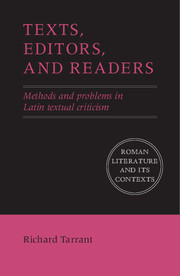Book contents
- Frontmatter
- Dedication
- Contents
- Preface
- Introduction
- 1 Textual criticism in a post-heroic age
- 2 The rhetoric of textual criticism/textual criticism as rhetoric
- 3 Establishing the text 1: recension
- 4 Establishing the text 2: conjecture
- 5 Establishing the text 3: interpolation, collaboration, and intertextuality
- 6 Textual criticism and literary criticism: the case of Propertius
- 7 Presenting the text: the critical edition and its discontents
- 8 The future: problems and prospects
- Appendix Reading a critical apparatus
- Bibliography
- General index
- Index of passages discussed
- Index of scholars
2 - The rhetoric of textual criticism/textual criticism as rhetoric
Published online by Cambridge University Press: 05 March 2016
- Frontmatter
- Dedication
- Contents
- Preface
- Introduction
- 1 Textual criticism in a post-heroic age
- 2 The rhetoric of textual criticism/textual criticism as rhetoric
- 3 Establishing the text 1: recension
- 4 Establishing the text 2: conjecture
- 5 Establishing the text 3: interpolation, collaboration, and intertextuality
- 6 Textual criticism and literary criticism: the case of Propertius
- 7 Presenting the text: the critical edition and its discontents
- 8 The future: problems and prospects
- Appendix Reading a critical apparatus
- Bibliography
- General index
- Index of passages discussed
- Index of scholars
Summary
It is not easy to discover from what cause the acrimony of a scholiast can naturally proceed … The various readings of copies, and different interpretations of a passage, seem to be questions that might exercise the wit, without engaging the passions … Perhaps the lightness of the matter may conduce to the vehemence of the agency; when the truth to be investigated is so near to inexistence, as to escape attention, its bulk is to be enlarged by rage and exclamation.
(Johnson, Preface to Shakespeare)For centuries one of the most striking characteristics of textual criticism has been its fondness for strongly coloured rhetoric. In the first part of this chapter I want to examine that rhetoric and ask what it implies about textual criticism as an activity. The penchant for denunciation that Johnson so effectively deflates will play a part in the discussion, but I am even more interested in the metaphors that textual critics employ, often without conscious reflection, in the course of their work. The second section focuses on the absence of proof in textual criticism and the central role played by persuasive argument, or rhetoric in another sense.
I
Areas of study characterize themselves by their preferred rhetorical modes. Particle physics is a good example, a field in which equations can be described as ‘beautiful’ or ‘elegant’ and where ‘quarks’ (a term derived from Joyce's Finnegans Wake) come in ‘flavours’ including ‘charm’ and ‘strange’. The terminology evokes an atmosphere of aesthetic pleasure touched by whimsy.
Textual criticism, by contrast, has gravitated towards images of crime and disease. Some of those images are so pervasive that their metaphorical character is largely forgotten, such as describing erroneous manuscript readings as ‘corrupt’ or calling manuscripts ‘witnesses’. But we also find more exuberant uses of such imagery, as in the following quotations from F. A. Wolf and Lachmann portraying textual difficulties as sites of illness or infection: Wolf Iusta recensio … emplastis solutis ulcera nudat (‘a true recension … takes off the bandages and lays bare the sores’); Lachmann Illa pestis ingruit, quae … pro uulneribus emplastra et foedissimas cicatrices reliquit’ (‘that plague breaks out which … leaves bandages and disgusting scars in place of wounds’).
- Type
- Chapter
- Information
- Texts, Editors, and ReadersMethods and Problems in Latin Textual Criticism, pp. 30 - 48Publisher: Cambridge University PressPrint publication year: 2016

